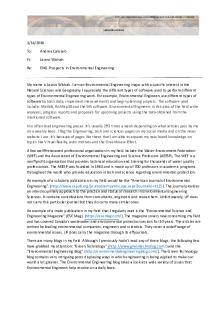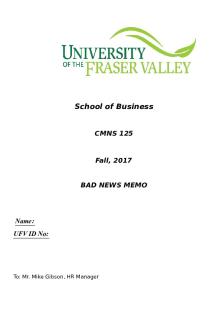WRIT3562W - Interview Memo PDF

| Title | WRIT3562W - Interview Memo |
|---|---|
| Course | Technical And Professional Writing |
| Institution | University of Minnesota, Twin Cities |
| Pages | 5 |
| File Size | 69.6 KB |
| File Type | |
| Total Downloads | 99 |
| Total Views | 144 |
Summary
Interview Memo for 3562W...
Description
Pankratz 1
Britton Pankratz WRIT3562W Capper Nichols 26 October 2015 Interview Memo
In a technological world filled with “text talk” and emojis, writing has become one of the most difficult skills to develop and be successful with. Most people shy away from writing classes because they feel that writing is an old fashioned skill and is no longer relevant in today’s electronic world. However, through two discussions with professionals in the Agronomy department at the University of Minnesota, it seems that this misconception couldn’t be further from the truth. Writing is more important in today’s technological society that at any other time in the past, and being proficient in communication through writing media will only become more critical as time progresses. Paul Porter is a professor and research scientist in the Department of Agronomy and Plant Genetics at the University of Minnesota St. Paul Campus. Paul received his PhD in Agronomy in 1986 and currently works on the research of alternative cropping systems and the study of global agroecosystems. He serves as chairman of the Student Conduct Board at the U of M and also instructs two courses on campus. Paul has been employed by the University for 20 years and has worked extensively at the research plots located in Lamberton, Minnesota researching alternative cropping systems to the conventional corn and soybean rotation of the Midwest United States. Craig Sheaffer is also a professor and research scientist in the Department of Agronomy and Plant Genetics at the University of Minnesota. He received his PhD in 1977 in Maryland and currently works in development of sustainable cropping systems and is the director of the sustainable agriculture graduate program. Craig has been employed at the University for 38 years
Pankratz 2
and has written numerous extension bulletins, grants, published articles, technical and peer review publications, and even a few textbooks for classes he instructs at the U. Prior to being employed at the University, Paul was involved in the Peace Corps, which allowed him to travel to Africa and South America, among many other locations. He explained that during his travels “[Paul] liked to keep journals, most of which [he has] never read, but it helped [him] to visualize what occurred that day and that helped [him] retain [his] memories much more vividly”. Paul also stated that he was not very proficient when it comes to reading and that “[Paul] can visualize graphs and tables much more quickly because [he is] not a good reader and [his] eyes do not track for long periods of time before [he becomes] distracted and vision becomes blurred”. During his time in the Peace Corps, Paul traveled to Africa and South America studying and teaching agricultural practices and bringing new ideas and concepts back to the United States. Being an avid bicyclist, he even biked across much of the two continents while he was away from home; learning, taking pictures, and teaching others about his passion for Agriculture. When he was located in Africa, Paul would conduct audio blogs daily where he would call a specified number, record his blog, and then an associate back in the United States would download that information, convert it to a text, and present it to a class. This was frustrating to Paul because “[Paul] would often lose connection and it would take an hour to do a four minute audio blog”. Paul and Craig discussed how much writing has evolved in their lifetimes and that it was a difficult adaptation to make for many. Paul’s education occurred at a critical transition of this technology and he explained “It was a fairly big change to have computers come along, so when I did my Master’s degree, I used a typewriter for my writing and when I did my PhD only two years later, it was with a computer. So that put me right at the cusp of that major technological
Pankratz 3
change.” Craig also explained that all of his writing while attending school was printed out and stored in files, and now 90% of his work is stored only on the internet and there are no paper copies of his work. Although Paul and Craig have both lived through two eras of writing, they stated that they prefer hard copies of their work. From the moment that both Craig and Paul were asked if they would be willing to sit down for an interview regarding their relationships with writing and their work, both continually emphasized its critical importance in a professional career setting. Craig explained that “writing is the primary and most important form of communication for me”. He described his form of writing as “a technical style that is often difficult for the average person to read, but is related to the field of inquiry.” This is likely because his published works are formatted almost exclusively in the past tense and do not contain statements with pronouns such as “We conducted a process that...” or “I found that the results showed…” but rather eliminate the human factor from his work and focus solely on the research. Paul further reinforced Craig’s statement by explaining that his entire thesis statement for his PhD in Agronomy needed revision because it was not written in the past tense and contained numerous pronouns. Craig described this particular form of writing as a style that makes one “lose some of your soul when you do that” and says “I suspect that people who write these kinds of textbooks die at a young age”. In addition to professionally published works for the populous, Craig and Paul instruct two courses at the University in which they utilize a completely different style of writing. Craig explained that the other half of his work with writing is much more personal and less strict on formatting which includes tests and assignments, coursework, and emails to students and other faculty. Paul finds this a difficult transition to make multiple time every day and says that
Pankratz 4
separating these two types of writing styles can be a challenge on days where there are many tasks he must accomplish in each of his lines of his work. Being employed in a research based position, Craig says that his most valued readers, aside from students, are citizens of Minnesota and the world. He focuses on educating farmers, ag professionals, industry leaders, and other scientists in order to improve global agriculture and education within the industry. Paul places a great deal of importance on his students and stated that they are the future generation of agriculture and educating them is vital to the continued progression of the industry. Writing plays a large part in Craig’s work as a research scientist and while he draws mainly on his own research for information, Craig occasionally references other research professionals such as Paul and others in the department to convey the information he sees fit. Working in teams with professionals in different fields is quite common in his line of work and communication is key when this type of collaboration occurs. When he finds himself in a position that requires the writing of multiple individuals, Craig first discusses how to present information with other professionals in his field and then proceeds to to define responsibilities within the group. After each member contributes what information they are able, they each review the writing of others to fact check and improve the effectiveness of the writing. He describes that the main challenge of working in groups that must collaborate to write a publication is “understanding that people have different writing styles, and this is something I must adapt to in order to be effective”. Although Craig and Paul are very practiced in writing as part of their careers, they both still face challenges that make it difficult to properly utilize writing as effectively as possible. One of Craig’s obstacles is to structure his structuring his writing in a way that is has a
Pankratz 5
meaningful and rational flow of information that he would present to any given audience. Being a research based professor, many of the readers of Craig’s work are scientists in the same field of study, and as a result he does not receive feedback from the general public as often. Paul finds it very difficult to structure his sentences as effectively as he would like them to be and states “I like to mull over sentences until I feel that they get the point across to the fullest extent.” The most rewarding aspect of writing that Craig and Paul find to make all their work worth the time put in is when they hear from a student, farmer, or an agriculture professional that they have read Craig or Paul’s work and found value in it. Both expressed that they take a great deal of pride pride in being able to help people make positive changes in both their academic and professional careers. Communication is vitally important and to most professionals, writing is the primary form of communication between researchers, instructors, farmers, and agricultural professionals. While writing classes may end when one graduates college, both of these highly accomplished career professionals have showed that writing never truly ends and in order to be successful and effective in one’s career, writing must be further developed and improved throughout every career path, whether it be in agriculture, engineering, journalism, or business....
Similar Free PDFs

WRIT3562W - Interview Memo
- 5 Pages

Potential Client Interview Memo
- 2 Pages

Memo to Professor from Interview
- 1 Pages

WRIT3562W - Technical Definition
- 2 Pages

Memo - Memo
- 2 Pages

Memo - Business Memo Assignment
- 2 Pages

Memo - Memo for stocks
- 2 Pages

Interview
- 3 Pages

Interview
- 6 Pages

Memo 1 - Memo 1 Assignment
- 2 Pages

Laptop Memo - BIT-200 Memo
- 2 Pages

TWC Assignment Memo 2 and Memo 4
- 4 Pages
Popular Institutions
- Tinajero National High School - Annex
- Politeknik Caltex Riau
- Yokohama City University
- SGT University
- University of Al-Qadisiyah
- Divine Word College of Vigan
- Techniek College Rotterdam
- Universidade de Santiago
- Universiti Teknologi MARA Cawangan Johor Kampus Pasir Gudang
- Poltekkes Kemenkes Yogyakarta
- Baguio City National High School
- Colegio san marcos
- preparatoria uno
- Centro de Bachillerato Tecnológico Industrial y de Servicios No. 107
- Dalian Maritime University
- Quang Trung Secondary School
- Colegio Tecnológico en Informática
- Corporación Regional de Educación Superior
- Grupo CEDVA
- Dar Al Uloom University
- Centro de Estudios Preuniversitarios de la Universidad Nacional de Ingeniería
- 上智大学
- Aakash International School, Nuna Majara
- San Felipe Neri Catholic School
- Kang Chiao International School - New Taipei City
- Misamis Occidental National High School
- Institución Educativa Escuela Normal Juan Ladrilleros
- Kolehiyo ng Pantukan
- Batanes State College
- Instituto Continental
- Sekolah Menengah Kejuruan Kesehatan Kaltara (Tarakan)
- Colegio de La Inmaculada Concepcion - Cebu



